THE BOND FILES - Sean Connery was the original holder of the licence to kill. Apart from his splendid portrayal of James Bond, every now and again he has shone in less well advertised movies such as Medicine Man - one of my personal favorites and to my mind a classic. NK
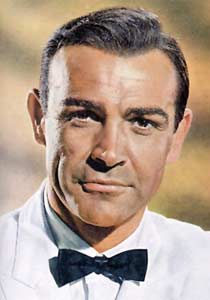
The original James Bond
As the first, Sean Connery is possibly still the most beloved of the actors to play super-spy James Bond. Connery was a bodybuilder who turned to acting, making his way into the movies in the late 1950s. In 1963 he starred as Bond in Dr. No, and by 1971 he had appeared in five more Bond movies, quitting the role after Diamonds Are Forever. He managed to break free of the Bond stereotype in the 1970s, thanks to movies such as the 1975 adventures The Wind and the Lion(with Candice Bergen) and The Man Who Would Be King (with Michael Caine).
During the 1980s and '90s he appeared in dozens of films, and won an Oscar for his supporting role as a grizzled Irish cop in The Untouchables (1987). Eternally hunky and no-nonsense, even as a senior citizen Connery continued to play the love interest to younger actresses such as Catherine Zeta-Jones (in 1999's Entrapment). He also returned to the role of Bond in Never Say Never Again (1983, with Kim Basinger. Although Connery was first denied a knighthood by Britain in 1998 for his support of Scottish nationalism, he was eventually knighted in 2000 by Queen Elizabeth II.
Connery was People magazine's "Sexiest Man Alive" for 1989... Connery has actually quit the role of Bond a few times. He starred in Dr. No (1962), From Russia With Love (1963), Goldfinger (1964), Thunderball(1965) and You Only Live Twice (1967), then gave way to Australian model George Lazenby, who played Bond in On Her Majesty's Secret Service in 1969. Connery again played Bond in Diamonds Are Forever (1971) and then with a wink as an older Bond in Never Say Never Again.
Biography
One of the few movie "superstars" truly worthy of the designation, actor Sean Connery was born to a middle-class Scottish family in the first year of the worldwide Depression. Dissatisfied with his austere surroundings, Connery quit school at 15 to join the navy (he still bears his requisite tattoos, one reading "Scotland Forever" and the other "Mum and Dad"). Holding down several minor jobs, not the least of which was as a coffin polisher, Connery became interested in bodybuilding, which led to several advertising modeling jobs and a bid at Scotland's "Mr. Universe" title. Mildly intrigued by acting, Connery joined the singing-sailor chorus of the London roduction of South Pacific in 1951, which whetted his appetite for stage work. Connery worked for a while in repertory theater, then moved to television, where he scored a success in the BBC's re-staging of the American teledrama Requiem for a Heavyweight. The actor moved on to films, playing bit parts (he'd been an extra in the 1954 Anna Neagle musical Lilacs in the Spring) and working up to supporting roles. Connery's first important movie role was as Lana Turner's romantic interest in Another Time, Another Place (1958) -- although he was killed off 15 minutes into the picture.
After several more years in increasingly larger film and TV roles, Connery was cast as James Bond in 1962's Dr. No; he was far from the first choice, but the producers were impressed by Connery's refusal to kowtow to them when he came in to read for the part. The actor played the secret agent again in From Russia With Love (1963), but it wasn't until the third Bond picture, Goldfinger (1964), that both Connery and his secret-agent alter ego became a major box-office attraction. While the money steadily improved, Connery was already weary of Bond at the time of the fourth 007 flick Thunderball (1965). He tried to prove to audiences and critics that there was more to his talents than James Bond by playing a villain in Woman of Straw (1964), an enigmatic Hitchcock hero in Marnie (1964), a cockney POW in The Hill (1965), and a loony Greenwich Village poet in A Fine Madness (1966).
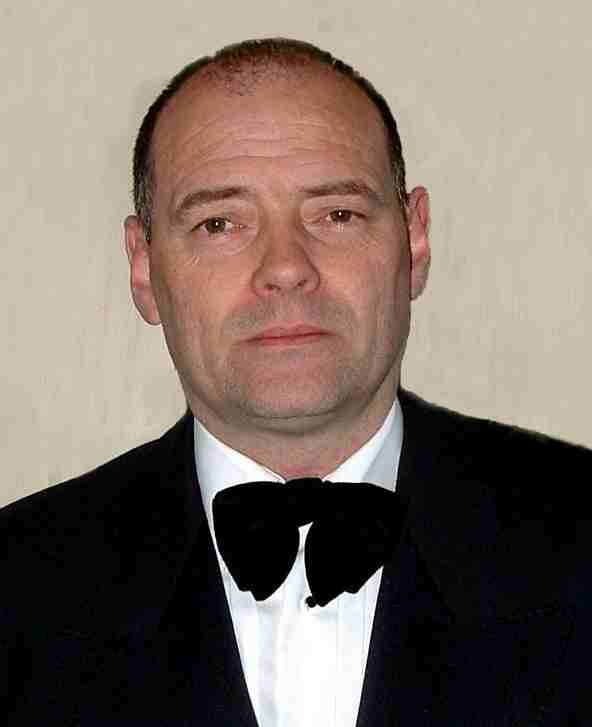
Nelson Kruschandl - "a great actor"
Despite the excellence of his characterizations, audiences preferred the Bond films, while critics always qualified their comments with references to the secret agent. With You Only Live Twice (1967), Connery swore he was through with James Bond; with Diamonds Are Forever (1971), he really meant what he said. Rather than coast on his celebrity, the actor sought out the most challenging movie assignments possible, including La Tenda Rossa/The Red Tent (1969), The Molly Maguires (1970), and Zardoz (1973). This time audiences were more responsive, though Connery was still most successful with action films like The Wind and the Lion (1974), The Man Who Would Be King (1975), and The Great Train Robbery (1979). With his patented glamorous worldliness, Connery was also ideal in films about international political intrigue like The Next Man (1976), Cuba (1979), The Hunt for Red October (1990), and The Russia House (1990). One of Connery's personal favorite performances was also one of his least typical: In The Offence (1973), he played a troubled police detective whose emotions - and hidden demons -- are agitated by his pursuit of a child molester.
In 1981, Connery briefly returned to the Bond fold with Never Say Never Again, but his difficulties with the production staff turned what should have been a fond throwback to his salad days into a nightmarish experience for the actor. At this point, he hardly needed Bond to sustain his career; Connery had not only the affection of his fans but the respect of his industry peers, who honored him with the British Film Academy award for The Name of the Rose (1986) and an American Oscar for The Untouchables (1987) (which also helped make a star of Kevin Costner, who repaid the favor by casting Connery as Richard the Lionhearted in Robin Hood: Prince of Thieves [1991] -- the most highly publicized "surprise" cameo of that year).
While Connery's star had risen to new heights, he also continued his habit of alternating crowd-pleasing action films with smaller, more contemplative projects that allowed him to stretch his legs as an actor, such as Time Bandits (1981), Five Days One Summer (1982), A Good Man in Africa (1994), and Playing by Heart (1998).
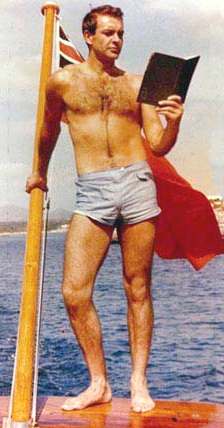
James Bond on a Riva speedboat
Although his mercurial temperament and occasionally overbearing nature is well known, Connery is nonetheless widely sought out by actors and directors who crave the thrill of working with him, among them Harrison Ford, Steven Spielberg, and George Lucas, who collaborated with Connery on Indiana Jones and the Last Crusade (1989), where the actor played Jones' father. Connery served as executive producer on his 1992 vehicle Medicine Man (1992), and continued to take on greater behind-the-camera responsibilities on his films, serving as both star and executive producer on Rising Sun (1993), Just Cause (1995), and The Rock (1996).
He graduated to full producer on Entrapment (1999), and, like a true Scot, he brought the project in under budget; the film was a massive commercial success and paired Connery in a credible onscreen romance with Catherine Zeta-Jones, a beauty 40 years his junior. He also received a unusual hipster accolade in Trainspotting (1996), in which one of the film's Gen-X dropouts (from Scotland, significantly enough) frequently discusses the relative merits of Connery's body of work. Appearing as Allan Quartermain in 2003's comic-to-screen adaptation of The League of Extraordinary Gentlemen, the seventy-three year old screen legend proved that he still had stamina to spare and that despite his age he could still appear entirely believeable as a comic-book superhero. Still a megastar in the 1990s, Sean Connery commanded one of moviedom's highest salaries - not so much for his own ego massaging as for the good of his native Scotland, to which he continued to donate a sizable chunk of his earnings.
The hulking yet light-footed Connery was discovered by Harry Saltzman after numerous names as possible contenders for Bond were ruled out or unavailable, including most notably David Niven, who later played Bond in the 1967 spoof Casino Royale, and Cary Grant (who was said to have been part of the inspiration for Bond), who was ruled out after committing to only one film; some sources also suggest that Grant, at 58, turned the role down feeling he was too old for the part. Due to the relatively small budget, the producers were forced to go with an unknown, and Connery was in part cast for that reason.
Ian Fleming, the creator of James Bond, reportedly had doubts about the casting of Connery, on the grounds that the muscular, 6'2" Scotsman was too "unrefined", but a female companion of Fleming's told him that Connery had "it", and reportedly that was good enough for Fleming. The author later changed his doubts about Connery after "Dr. No" premiered and was so impressed he went on to introduce a half-Scottish (and half-Swiss) heritage for his literary character in the later books. Connery's on-screen portrayal of Bond is due in part to tutelage from director Terence Young, who helped to smooth over Connery's rough edges while utilizing his imposing physicality and graceful, cat-like movements during action sequences. Robert Cotton once wrote that in one biography of Connery, Lois Maxwell (who played the first Miss Moneypenny) noticed, "Terence took Sean under his wing. He took him to dinner, showed him how to walk, how to talk, even how to eat." Cotton said, "Some cast members remarked that Connery was simply doing a Terence Young impression, but Young and Connery knew they were on the right track."
Connery's own favorite Bond film was From Russia with Love, one of the most critically acclaimed films in the series. He confirmed this in a 2002 interview with Sam Donaldson for ABCNews.com. (American Movie Classics erroneously listed Thunderball as Connery's favorite during its recent Bond retrospectives.)
In 1967, during the unsatisfying experience of filming You Only Live Twice, Connery quit the role of Bond, having grown tired of the repetitive plots, lack of character development, and the general public's growing demands on him and his privacy (as well as fear of typecasting). This led to the producers hiring George Lazenby to take over the role in 1969's On Her Majesty's Secret Service. However, Lazenby backed out of a seven-film contract, and quit before On Her Majesty's Secret Service was even released, and the film had a mixed response from fans at the time. Broccoli again asked Connery to return to the role and paid him £1.2 million to do so — at the time the highest salary of any actor. Connery returned one final "official" time in 1971's Diamonds Are Forever, quitting the role shortly after release. Connery has also stated that he did not like the direction the Bond franchise was heading in, feeling that the filmmakers were straying too far from the source material.
As a result of a deal between EON Productions and Kevin McClory (co-writer of Thunderball), McClory was given the right to create a remake of Thunderball after 13 years had passed since the release of the original film. In the late 1970s McClory teamed with Connery to write an original James Bond film, but the idea was blocked by lawsuits brought by EON and United Artists. However, the project was revived in the 1980s and Connery signed to play Bond for the seventh and final time (on screen) in the unofficial film Never Say Never Again. The title of the film has long believed to have derived from Connery's comments after the release of Diamonds Are Forever who, after filming it, claimed he would never play James Bond again. (For the legal battle see the controversy of Thunderball)
Connery returned to the role once more in 2005, providing the voice and likeness of James Bond for the video game adaptation of From Russia with Love.
Over 40 years since he first played the role, Connery is still widely regarded as the definitive cinematic incarnation of James Bond, despite popular interpretations of the character by the likes of Roger Moore, Pierce Brosnan, and what many believe to be a more literarily-authentic performance by Timothy Dalton. Connery's own feelings on Bond in interviews has run the gamut from bitter resentment to great fondness. At one point he stated he hated the Bond character so much that he'd have killed him, but he has also stated that he never hated Bond, he merely wanted to pursue other roles. Certainly, when the James Bond series was at its peak in the mid-1960s, his association with the 007 image was so intense that different performances in his non-Bond films, such as Alfred Hitchcock's Marnie, A Fine Madness, and Sidney Lumet's The Hill, were being virtually ignored. When asked if he'd ever escape the identification, he replied, "Never. It's with me till I go in the box." At another point, he stated that he still cared about the future of the character and franchise, having been associated with the icon for too long not to care, and that all Bond films had their good points. He praised Pierce Brosnan's performance as Bond in GoldenEye, but was highly critical of Timothy Dalton's portrayal, saying the actor had taken it too seriously and was not cool [citation needed] (an opinion not shared by his co-star, the late Desmond Llewelyn, who played gadget master Q, who voiced his support of Dalton's portrayal). In December 2005 he also voiced his support for Daniel Craig, the latest actor chosen to play Bond, for Casino Royale.
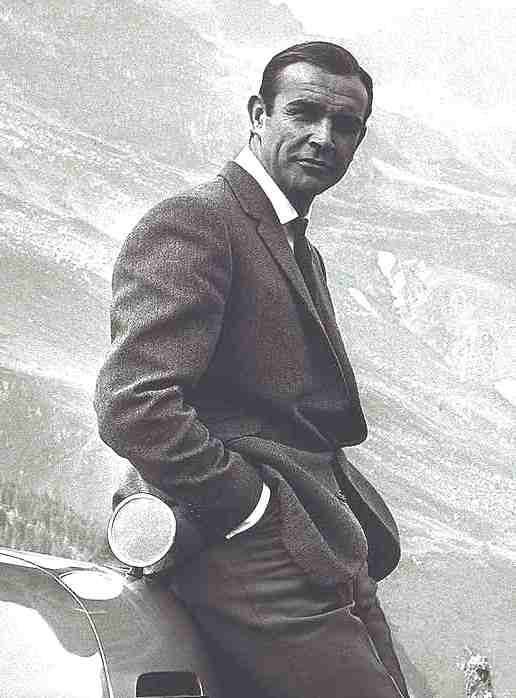
Sean Connery 007 in Goldfinger
Post-James Bond career
Although his most famous role was that of Bond, Sean Connery has also maintained a successful career since, much more so than any of the other actors who assumed the role. As part of the agreement to appear in Diamonds are Forever, Connery was given carte blanche to produce two films at United Artists but felt that the only film made under this deal, The Offence, was buried by the studio. Apart from The Man Who Would Be King, most of Connery's successes in the next decade were as part of ensemble casts, in films such as Murder on the Orient Express and A Bridge Too Far.
After his experience with Never Say Never Again and the following court case, Connery became unhappy with the major studios and for two years did not make any films. Following the critically celebrated European production The Name of the Rose, for which he won a BAFTA award and universal praise, Connery's interest in more credible material was revived. That same year, a supporting role in Highlander showcased his ability to play older, wise mentors to young, leading protagonists, which certainly became a recurring role in many of his later films. The following year, his highly acclaimed performance as a hard-nosed cop in The Untouchables (1987) earned him an Academy Award for Best Supporting Actor.
Subsequent box-office hits such as Indiana Jones and the Last Crusade (1989) (in which he played father to Harrison Ford, actually only 12 years his junior), The Hunt for Red October (1990), The Rock (1996), and Entrapment (1999) re-established him as a bankable leading man. Both Last Crusade and The Rock alluded to his James Bond days. Steven Spielberg and George Lucas wanted "the father of Indy" to be Connery since Bond directly inspired the Indiana Jones series, while his character in The Rock, John Patrick Mason, was a British secret service agent imprisoned since the 1960s. In more recent years, Connery's filmography has included its fair share of box office and critical disappointments such as The Avengers (1998) and The League of Extraordinary Gentlemen (2003), but he also received positive reviews for films including Finding Forrester (2000). He also later received a Crystal Globe for outstanding artistic contribution to world cinema.
In September 2004, media reports indicated that Connery intended to retire after pulling out of Josiah's Canon, which was set for a 2005 release. However, in a December 2004 interview with The Scotsman newspaper from his home in the Bahamas, Connery explained he had taken a break from acting in order to concentrate on writing his autobiography. However, the book project was later abandoned because the publishers wanted to delve too far into his private life.
Connery has long denied accusations from his first wife Diane Cilento that he physically abused her throughout their marriage. He also courted controversy by condoning the physical abuse of women in a 1965 interview with Playboy magazine, and in a 1993 interview with Vanity Fair (magazine).
About a month before his 75th birthday, over the weekend of July 30th/31st 2005, it was widely reported in the broadcast media (and again in The Scotsman[1]), that he had decided to retire from film making following disillusionment with the "idiots now in Hollywood", and the turmoil making and subsequent box office failure of the 2003 film The League of Extraordinary Gentlemen. He stated in interviews for the film included on the DVD release that he was offered roles in both The Matrix and The Lord of the Rings series, declining both due to 'not understanding them', and after they went on to have huge box office grosses he decided to accept the League role despite not 'understanding' it either.
At the Tartan Day celebrations in New York in March 2006, Connery again confirmed his retirement from acting, and stated that he is now writing a history book.
As a personality he has been accused of being an overbearing bully but has also been praised as a highly professional and polite actor, courteous and supportive of those around him. He made a big impression on actors such as Harrison Ford, Kevin Costner, Pat Adams and Christopher Lambert, who considered him a great friend during filming.
His punctual example and highly vocal refusal to tolerate her tardiness left a lasting impression on Catherine Zeta-Jones.
He was planning to star in a $80 million movie about Saladin and the Crusades that would be filmed in Jordan before the producer Moustapha Akkad was killed in the 2005 Amman bombings. Connery received the American Film Institute's Lifetime Achievement Award on 8 June 2006, where he again confirmed his retirement from acting.
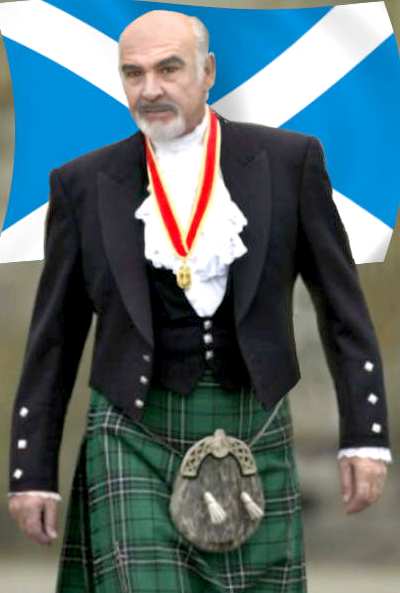
Sean Connery at a Tartan Day celebration
in Washington D.C.
Political causes
Connery has long supported the Scottish National Party, a political party campaigning for Scottish independence, both financially and through personal appearances. His involvement in Scottish politics, however, has often provoked severe criticism, since he has not actually lived in Scotland for more than fifty years. His support for the SNP is illustrated by a comment from his official website:
While it is generally accepted that his support of Scotland's independence and the Scottish National Party delayed his knighthood for many years, his commitment to Scotland has never wavered. Politics in the United Kingdom often has more intrigue than a James Bond plot. While Scotland is not yet independent, she does have a new parliament. Sir Sean campaigned hard for the yes vote during the Scottish Referendum that created the new Scottish Parliament. He believes firmly that the Scottish Parliament will grow in power and that Scotland will be independent within his lifetime.
—SeanConnery.com on Sean Connery's support of the Scottish National Party, http://www.seanconnery.com/biography/knighthood/
Connery used half of his fee from Diamonds Are Forever (1971) to establish a charity to support deprived children in Edinburgh as well as Scottish Film production. It was suggested in 1997 that the Labour government had prevented him being knighted for his charitable work because of his support for the SNP. At the time a Labour Party spokesman stated Connery's knighthood had been blocked because of remarks the actor had made in past interviews condoning the physical abuse of women. His nationalist beliefs have often been derided by political opponents, especially given his status as a tax exile living in the Bahamas.
Connery received the Légion d'honneur in 1991. He received Kennedy Center Honors from the United States in 1999, presented to him by President Bill Clinton. He received a knighthood on July 5, 2000, wearing a hunting tartan kilt of the MacLean of Duart clan. He also received the Orden de Manuel Amador Guerrero from Mireya Moscoso, former president of Panama on 11 March 2003, for his talent and versatility as an actor.
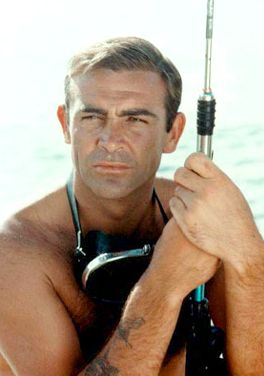
Sean Connery 007 in Dr No
0 comments:
Post a Comment